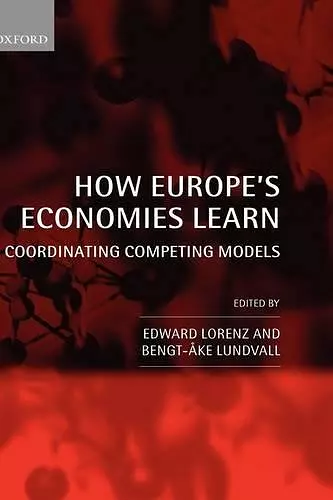How Europe's Economies Learn
Coordinating Competing Models
Bengt-Åke Lundvall editor Edward Lorenz editor
Format:Hardback
Publisher:Oxford University Press
Published:7th Dec '06
Currently unavailable, and unfortunately no date known when it will be back

When seeking to bench mark the performance of European economies, commentators often look to compare them to the economies of Japan and the United States. How Europe's Economies Learn shows how this is seriously misleading, and how any such comparison needs to be complemented with an understanding of the fundamental differences between Europe's economies. The contributors provide an up-to-date description and analysis of the way differences in state systems and institutional contexts, such as labour markets, education and training systems, and financial systems, shape learning processes and innovation performance across the member nations of the European Union. In doing so, it draws important conclusion for how policy strategies should be designed at the national and European levels in order to further promote the goals of the Lisbon process.
This book is the most elaborated attempt to bridge three crucial theoretical and policy-oriented agendas: innovation, labour market and human resources. These are the very key sources for a successful European economic performance. The European Council - the most authoritative institution of the Old Continent - has clearly recognized it since its Summit in Lisbon. But what conditions should be met to transform Europe into the most dynamic knowledge economy of the world? The essays in this volume show what transformations are required to benefit from current technological opportunities. The contributors indicate that Europe can pioneer a new way of managing innovation and human resources in the world learning society. * Daniele Archibugi, Professor, Italian National Research Council *
We have long been familiar with 'learning by doing' and 'learning by using'. The editors of this book have each contributed a great deal to our understanding of both of these types of learning. But these and other types of learning often depend on comparisons between a variety of cases... The developing European Union offers a wonderful opportunity for the deployment of this technique and the book takes full advantage of this opportunity for the original and creative method of international comparisons in learning. * Chris Freeman, Emeritus Professor SPRU, Science and Technology Policy Research, University of Sussex *
The knowledge economy is said to be the future of Europe. The scholars, here assembled, display their quite extensive and diversified expertise in order tocarefully investigate why and how the learning economy requires definite complementarities between the academic world, the innovation system, the organisation of welfare and firms. They argue that the diversity of institutionalized learning processes is a chance and an invitation to redesign most domestic and European policies. The clarity of the diagnosis is a source of hope for renewed economic dynamism in Europe. * Robert Boyer, Directeur de Recherche, CNRS-CEPREMAP *
ISBN: 9780199203192
Dimensions: 240mm x 162mm x 32mm
Weight: 859g
480 pages